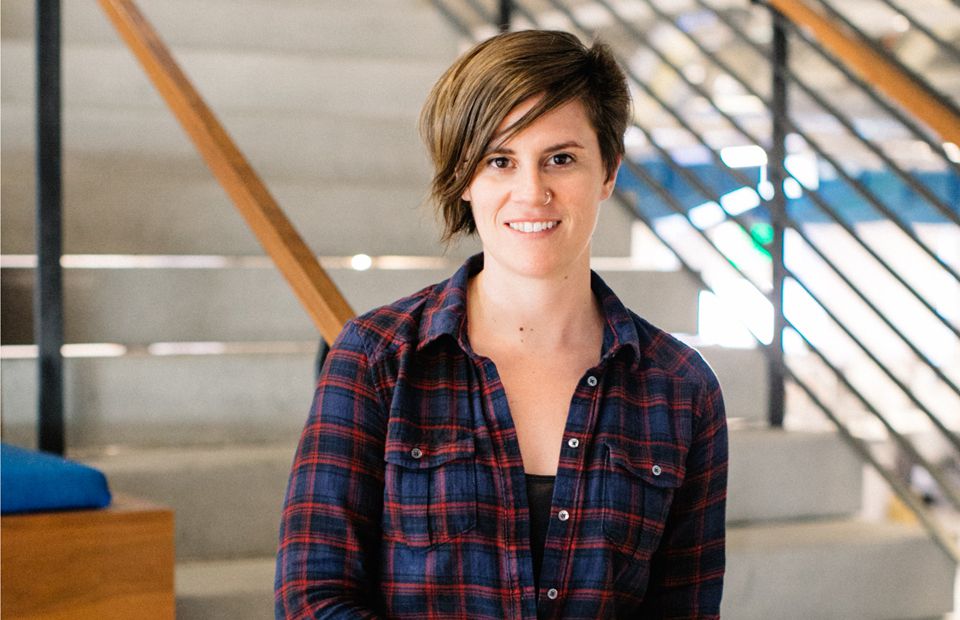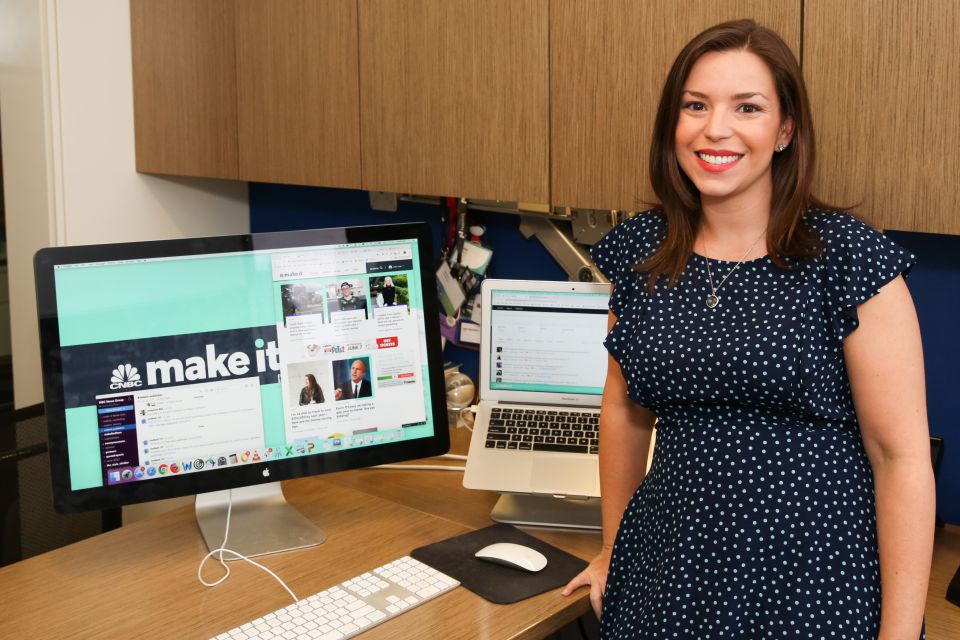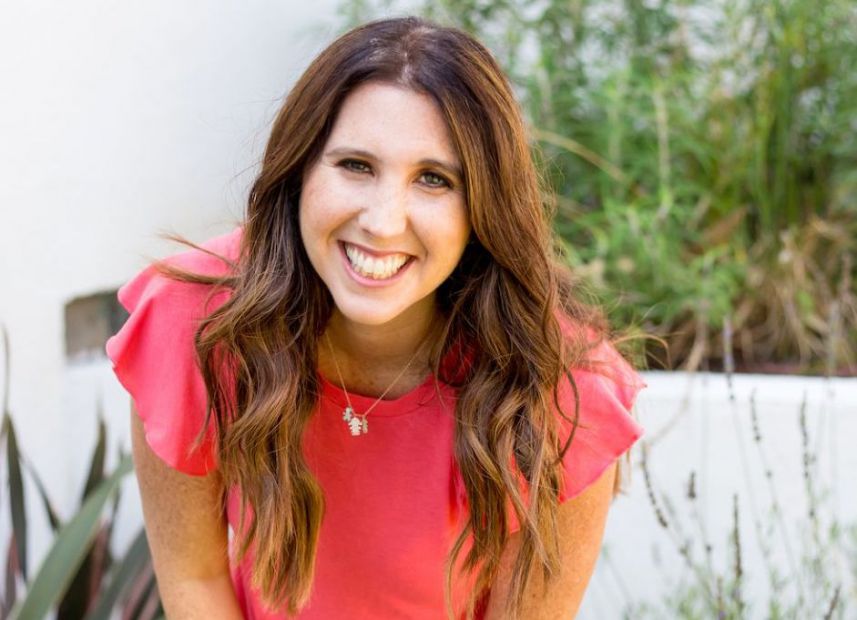“PPC,” “SEM,” “AdWords,” “concatenate formula”—this may sound like foreign language, but it’s one in which Jessica Ann Armendariz, 28, is fluent. A self-proclaimed “super data geek,” Jessica knows what it takes to garner serious success in search engine marketing. As the Senior PPC and Analytics Manager for Connelly Partners, this Misericordia University grad knows all of the latest in search-worthy trends.
A brief stint in sales at Enterprise Rent-A-Car right out of college left Jessica searching for more. Little did she know that “searching” would become the theme of her career. With valuable sales experience under her belt, this Contessa took her first online marketing job at Pepperiam, Inc., where she discovered the world of Search Engine Marketing. She was instantly hooked, and it was that excitement that paved the way to her senior role at Connelly Partners.
Not surprisingly, the art of linking keywords to the correct ads, landing pages and bidding on particular phrases can get pretty scientific. Jessica even admitted that PPC and SEO can come off (in her words) a bit nerdy. Yet during our interview, Jessica playfully swore that she and her team are a fun bunch, of which we have little doubt.
Photos: Courtesy of Connelly Partners
Her Starting Point
Many people find the transition between college and “real life” a bit daunting. Can you tell us about your journey between the two? What was your first job post-college?
My first post-college job was actually at Enterprise Rent-a-Car. I took an internship with the company mostly because it was paid and offered great sales experience, and from there I was hired on full-time after college. I quickly realized that although it taught me so much and gave me thick skin, rental cars weren’t exactly my calling. From there, I took my first online marketing job at a company called Pepperjam, Inc. in Wilkes-Barre, PA, which is now owned by GSI Commerce in Philadelphia. This was my first job in PPC or Paid Search marketing, and I was instantly hooked.
How did you come to work at Connelly Partners? What do you love most about the company?
After working at Pepperjam for a while, I realized I wanted a change and to live in a bigger city. I moved to Boston after getting a job at a company called Mindfire Interactive, which was quickly acquired by Connelly Partners and that’s how I became a part of the Connelly Partners interactive team.
I enjoy the environment and culture at CP. It’s a very “work hard, play hard” type of culture. There’s a bar in the middle of the office, for starters. I also have the opportunity to grow and shape the PPC side of the business here. Plus, I never thought I’d make so many friends in a work environment before coming to CP.
Search engine marketing (SEM), Pay-Per-Click (PPC), AdWords, bidding on keyword phrases—What does it all mean, and can you explain its importance in business?
The simplest way to think of this is if you’re looking to receive more information, book a vacation, buy something online, research a product—what do you do? You go to a search engine, of course. PPC is just as it sounds: Pay per click. Impressions on a search engine are free, but you only pay for the valued click—if someone chooses to click on your ad and visit your website. Unlike SEO, PPC requires a media budget as you pay for clicks, but it is a very cost-effective means to get a business’s website noticed by their target audience.
A good way to think of PPC is like a silent auction. As a Senior PPC Manager, I place bids on keywords or phrases that are relevant to my clients’ target audience. There’s keyword research and a bit of psychology to it: “what would a person type in a search field when they are looking for specific goods or services?” Organic search is obviously a great way to generate free traffic to your website, but often requires tweaks or updates to a website and a significant amount of time to see results.
There are so many benefits to utilizing PPC, including but not limited to: Instant flow of traffic, landing page control (you choose which pages of your site a user sees), precise tracking and adjustment (ability to choose which keywords you bid on and real-time campaign adjustments—tracking revenue, ROI, leads, sign-ups, etc.—at the keyword level to increase profitability), buy position on the search engine results page (if you want to rank #1 for a certain keyword or words, there is a way to do so with the right strategy).
Her Big Break
How did you learn the ins and outs of PPC? What types of training would you recommend to aspiring SEM professionals?
I was fortunate enough to receive the offer from Pepperjam and had some fantastic one-on-one training with the team there. I started off by setting up accounts only, not actively managing them, but this was wonderful for me because I was able to see the importance of creating campaigns and how to do it. This also is how I became proficient with Microsoft Excel. It isn’t like you just create a big keyword list, upload it and all is well. There’s a real science to setting up keywords to the right ads, landing pages and how to bid on each individual keyword. I also had to immediately become certified when I received my first PPC job, so I studied for three weeks for my Google AdWords Fundamentals Exam. This exam is usually required for any PPC position, and I would recommend utilizing the Google AdWords Help Center articles and videos for training. The tactics explained there can be applied to other search engines, such as Bing or Yahoo.
Paid search is something that isn’t taught in college or schools very often (if at all), so it’s a lot of reading, studying and hands-on practice.
Tell us about your daily tasks and responsibilities. How often do you travel? Does your job offer good work/life balance?
My daily tasks include a lot of budget management, keyword research, landing page testing, ad copy review and client management. It is one thing to track the success of keywords driving traffic to a website, but a lot of clients I work with have strict lead general or sales goals, and it’s my responsibility to make sure that when they’re spending money with the search engines, they’re receiving a profit or a benefit from it. I utilize Google Analytics a lot to understand what PPC visitors are doing when they arrive on a website or landing page. Where are they going? Where do they drop off and leave the site? Did they convert into a customer?
I don’t have to travel much for work, mainly because I’m plugging away on generating results for our existing PPC accounts. When I do travel, it’s great because it often means I get to meet with clients in person to review results, strategies and marketing plans.
PPC is a pretty time-consuming job as it requires a lot of management—you’re spending someone’s money and you want to spend it well. That’s also the great part about it. The industry is always changing and there’s always a new tactic to learn. I think this is what makes the job so exciting and rewarding. There’s no better feeling than going into a meeting and saying “I tried this strategy, and it worked!”
What are your strategies for remaining calm and focused in what can be a high-pressure position?
Strategies for remaining calm at work are the same as strategies for dealing with any difficult situation in life. I usually go with the motto “I’ll figure it out” or “I’m not saving lives.” It’s true, and I always do. There are certainly some unpredictable things that can happen within a PPC campaign. The #1 thing that has worked well for me is being proactive, being fully transparent with my clients and giving them full explanations of what’s going on in their account. If you’re doing all you can and you test something and it just happens to not work out, well then you know that it doesn’t work, and that’s actually a really positive takeaway for the PPC account. A positive attitude and staying relaxed during an intense situation can go a long way.
What tools do you use to stay current in your ever-changing industry?
I utilize blogs by Google and industry leaders to stay up to date with search marketing trends. Some of my favorites include the Google Adwords blog, PPC Hero, Search Engine Land and Search Engine Watch. There are also so many free webinars that are available online, so it’s really important for me to take time out and attend those when I can.
Her Perspective
What is your favorite part of your job? What is the most challenging?
Paid search marketing is a job that never ends. It’s ongoing and has the potential to be a 24-hours-a-day job. It’s my role as a professional to figure out ways to not make it a 24-hours-a-day job, and to set a client up for success even during non-traditional work hours.
The most challenging part of my job is relaying information in a way that demonstrates the true value of PPC for my clients. Unless you’re a super data geek like me, reviewing metrics of clicks, click-through-rates, cost-per-clicks and impression shares gets old pretty quick, so I have to relay information that is high-level and shows the true value for the business.
From your perspective, what do you consider key to producing measurably positive results in the paid search sector?
Organization, proactivity and patience. Keeping accounts organized is the #1, most important part of a PPC campaign, otherwise it’s very difficult to keep track of what keywords, ads and landing pages are working the best for you. If you have a PPC account with over 50,000 keywords, you can’t group them into one campaign with the same ad for each keyword—it wouldn’t be targeted and would be impossible to manage performance. In an ideal world, every 1-5 keywords would have their own group, their own targeted piece of ad copy and a very relevant landing page. This ensures you’re giving the user the best experience and helping them find exactly what they’re looking for.
Proactivity also is something that has really benefited me with managing campaigns. I always feel it’s important to keep track of trends and think of possible solutions down the road (whether it’s an update to a landing page or requesting an increase in budget due to competition).
Patience is another area of PPC that is often overlooked. To truly measure performance, you can’t make drastic changes to an account every single day. It’s important to keep up to date with management and tracking performance/budgets, but making too many changes at once doesn’t allow for any one change to have a chance to work or accrue data for accurate results.
If we had the chance to peek at your schedule, what would an average day look like?
My schedule is never the same. I can predict how busy my schedule will be in different weeks of the month, but a lot of the time it’s unpredictable. The beginning of the month is always busy because it’s the time where we crank out monthly reports and have monthly in-depth meetings with each of our clients. There are always new businesses on the horizon, though, and that’s something I have to prepare for to fit into my schedule.
What skills do you think are essential to succeeding in a career in PPC and paid search? What career options are out there for these types of experts?
I would say the top three skills that are essential to succeeding in PPC are: never being satisfied, proficiency with Microsoft Excel and curiosity. It’s easy to sit back and relax once things in your PPC account are going well, but it’s important to remember that the algorithm will always change, new competitors will always roll in and there’s always something you can test or try to improve performance even further. This goes hand in hand with curiosity and wanting the best for your clients.
If there’s one thing I’ve learned in my PPC career, it’s that after a period of time PPC becomes much easier to understand and speak about with clients. Speaking about PPC and actually implementing it on the backend are two completely different things though, and if you don’t have a strong knowledge of Microsoft Excel and want a career in PPC, I strongly suggest taking a class. There are tons of online courses and classes often offered at colleges or universities. If the concatenate formula, pivot tables and via lookup sound like a foreign language to you, time to get some excel practice in.
And finally, what do you wake up looking forward to? What’s next for your career?
I think the most exciting part about being in this industry and my career is waking up to see what is coming next. Google recently started testing images on the search results page with big brands (JetBlue, for example) when, years ago, they said they’d never do that. It’s great to be in an ever-changing industry and wondering where that will take me. I think next steps for me would include becoming part of a panel at a local search conference.
You May Also Like

Media
How to Use Positive Reinforcement at Work—and Other Advice from a Pandora PM
"My advice to anyone who wants to get into product management is: check your ego at the door."

Media, Communications + Public Relations
How to Take Risks, Make a Switch, and Find a Career You Love—From a Woman Who's Done It 4 Times
Making your wildest dreams come true starts with understanding yourself—and Ahyiana Angel can help.

Communications + Public Relations
Creating Content That Empowers Audiences with CNBC's Digital VP and Managing Editor
This week, we interviewed Jenna Goudreau, the VP and managing editor of CNBC Digital. Let's learn how she keeps her powerhouse content creation machine going.

Entertainment
Working Creatively From Home with Cathy Heller
Cathy Heller is a singer, songwriter, entrepreneur, mother—and now, an author. Determined to lift others up to the "happiest versions of themselves," this queen of the hyphenated job title, leads by example. She shared how to build a fulfilling career in a creative field—all while working from home.

Media
Women, Work, and What It's Like to Write With Your Best Friend—From the Authors of The Ambition Decisions
"We should all give ourselves permission to challenge the things we think can’t be challenged."

Media
A Director at Pandora on Staying Present, Celebrating Others, and Learning From Failure
"Share your wins, but most importantly, share what your growth areas are, share when you fail, share how you bounced back."
Get the Best Career Advice Delivered To Your Inbox
Join our newsletter to stay in the loop.
